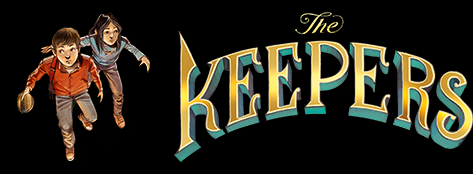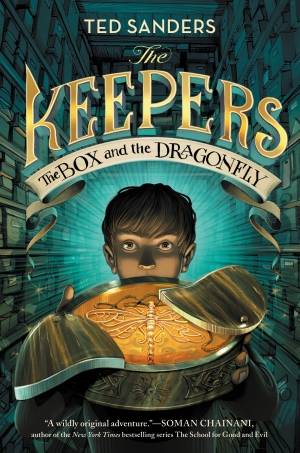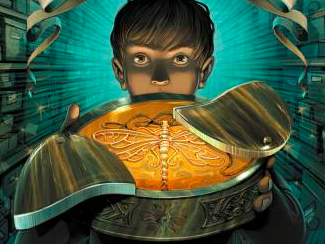
I always look forward to my infrequent opportunities to read young adult literature. I know that, when I do, I’ll be reading through a couple of different filters—first, the filter of the lifelong reader with the English degrees; second, and so much more importantly, the filter of a dad whose girls are currently 2 and 5 and will be reading on their own soon enough. With all this in mind, I snagged an Advance Reader copy and set to my task with filters in place.
I reminded myself, as I always do, that I am not necessarily the audience for this book, and that I should keep an open mind. Hope for the best, I thought, but still… several hundred pages of kid fiction…and is that a glossary at the end? (This thing requires a glossary?) But in I went. And then, to my immediate relief and eventual delight, something wonderful happened: I found a new filter.
The most frequent thought I had while reading Ted Sanders’ The Keepers: The Box and the Dragonfly was this: when I was about 12 years old, daydreaming my way through the seventh grade, I really could have used a book like this one. Twelve-year-old me was stuck in 1987 and living an hour from anything cool. Harry Potter wouldn’t happen for another ten years, and, even though Gary Paulsen’s Hatchet and Orson Scott Card’s Seventh Son were beginning to hit bookstore shelves, I didn’t know about them. There was no phenomenal, obsession-inducing book for kids my age to get lost in. So, instead, I read what was on my parents’ bookshelves — books like Dean Koontz’s Watchers and Stephen King’s Misery. I thoroughly enjoyed those books, by the way, but I wish (especially in the case of King’s novel) that I had been older.
Again, if only The Keepers had been around.
Here’s the back of the book, to give you an idea of the plot:
From the moment Horace F. Andrews sees the sign from the bus — a sign with his name on it — everything changes. The sighting leads him underground, to the House of Answers, a hidden warehouse full of mysterious objects. But there, he finds only questions.
Horace begins a journey that puts him in the middle of a centuries-old conflict between two secret sects. From the sinister thin man lurking around every corner to the gradual mastery of his newfound abilities to his encounters with Chloe — a girl who has an astonishing talent of her own — Horace follows a path that links him to the Box of Promises and a future he never saw coming.
This description of the book is both apt and a massive undersell, giving you almost no sense of the enchanting characters to be met within. Horace, the book’s protagonist, is endearing and intriguing from the get-go. He is our window into this adventure, and the reflection coming off that window could very easily be that of middle school me (a sentiment I imagine will be echoed by many a reader, young and less-young alike). Horace is a curious kid — one who doesn’t have a lot of experience in the real world, is shy around girls, a little uncomfortable in his own body. But his awkwardness doesn’t preclude him from being brave, and his ability to choose bravery over fear is consistently his best characteristic.
In Horace’s possession, after a trip to the aforementioned House of Answers, is a box that (man I do NOT want to give anything away here) allows him to see things he wouldn’t ordinarily be able to. Without spoiling what he can see or what he does with that information, let me just ask this: what kid wouldn’t love to be able to see things he or she usually can’t? Isn’t that part of being a twelve- or thirteen-year-old? Wanting knowledge of the unknown, even if the information you seek isn’t good for you?
 Throughout the book, Horace’s world — a pretty comfy one at first, with caring, brainy parents and supportive teachers — keeps getting rocked by fantastical, magical elements. One of the key selling points of Sanders’ narrative, though, is that, no matter how supernatural the intrusion, the action never strays far from its Chicago setting. Horace lives in the real world, which brings the average young reader that much closer to him; the beauty of this is that Sanders (pictured, right) suggests another world — one the rest of us cannot see — just down the next alley, just beneath the lowest sub-basement. What kid on the cusp of teendom and, ultimately, adulthood, doesn’t want to believe that his or her ordinary-looking school or neighbood conceals, within it, a much more magical place?
Throughout the book, Horace’s world — a pretty comfy one at first, with caring, brainy parents and supportive teachers — keeps getting rocked by fantastical, magical elements. One of the key selling points of Sanders’ narrative, though, is that, no matter how supernatural the intrusion, the action never strays far from its Chicago setting. Horace lives in the real world, which brings the average young reader that much closer to him; the beauty of this is that Sanders (pictured, right) suggests another world — one the rest of us cannot see — just down the next alley, just beneath the lowest sub-basement. What kid on the cusp of teendom and, ultimately, adulthood, doesn’t want to believe that his or her ordinary-looking school or neighbood conceals, within it, a much more magical place?
Also living in this reality are others like Horace — other young people, aged 12-18, each of them in possession of a seemingly magical instrument (called Tan’ji) that gives them extraordinary abilities. They are, you might have surmised, The Keepers of these objects, which are bound to them. There’s Gabriel, for instance, a blind kid who can see when others cannot. There’s also Neptune, who can’t exactly fly, but…
 And then there is Chloe, the flinty, secretive girl Horace’s age who can walk through walls. Chloe is a tremendous character who could easily carry her own book. She has the polar opposite of Horace’s domestic existence, and she is as confident and brash as Horace is cautious and diplomatic. Her journey is as important to the narrative as Horace’s, as both of them, in addition to the others, are just pieces in a much larger game of chess.
And then there is Chloe, the flinty, secretive girl Horace’s age who can walk through walls. Chloe is a tremendous character who could easily carry her own book. She has the polar opposite of Horace’s domestic existence, and she is as confident and brash as Horace is cautious and diplomatic. Her journey is as important to the narrative as Horace’s, as both of them, in addition to the others, are just pieces in a much larger game of chess.
There is so much to enjoy in these pages, and not just because the story is a good one. The care given to Horace and Chloe and to making them interesting characters as well as relatable kids is considerable and laudable. And, while the adults in their lives — from their parents to their super-secret supervisors to their enemies — have very slight shadings of other characters from other sci-fi and fantasy series (which is practically impossible to avoid), they are also truly compelling. [Personal aside: if you don’t picture local theatre icon Gary Ambler in the role of Mr. Meister, then I wanna know who you DO see.] I am particularly fascinated by Horace’s mother, who is just the right mix of nurturing and antagonistic. I suspect her ongoing role in Horace’s life (and the series) will be worth following.
Another feature of this book that I must mention is the humor, which is both smart and completely believable coming out of the mouths of the young Keepers. Booksmarts plus defensive sarcasm plus superpowers equals a fun and funny read, no matter what your age might be.
This is the first in a proposed four-book series, and I will be eagerly anticipating each new installment, not just because I can put them in my daughters’ bookcase for their later enjoyment, but because I am now quite badly hooked myself. This is the series I wish I had had access to when I was Horace’s age. But still I realize—as I mentioned before—that this isn’t necessarily for me. As an adult, I have the option to read this book, but it’s not there to wrinkle my brain the way it would have 12-year-old me’s. This is the book you find on your own at age 10 or 12 and read alone. This is the book you cherish for its strange, alien words and concepts, for its clever use of time travel, and perhaps even for its one or two very mild curse words and anti-grown-up sentiment. And yeah, there’s a glossary at the back. You’ll never need it.
This is a compellingly readable book that promises so much discovery to come. Every chapter has both real-world lessons and comic book wonderment, and the ending (of this installment, anyway) leaves you with the feeling us older folks used to get from a good episode of The Twilight Zone. If you’re a kid who loved Harry Potter and is between Rick Riordan books, this is the new story you’ve been looking for. And if you’re a parent, this is the book you give your kid and then leave them alone to explore. This is their world, and these are their peers. Don’t get me wrong: you should read it, too. But you should have your own copy.
The Keepers: The Box and the Dragonfly is available from various outlets, both online and brick-and-mortar. Check out the author’s website for more info. For an audio preview of Chapter 1, click here.








